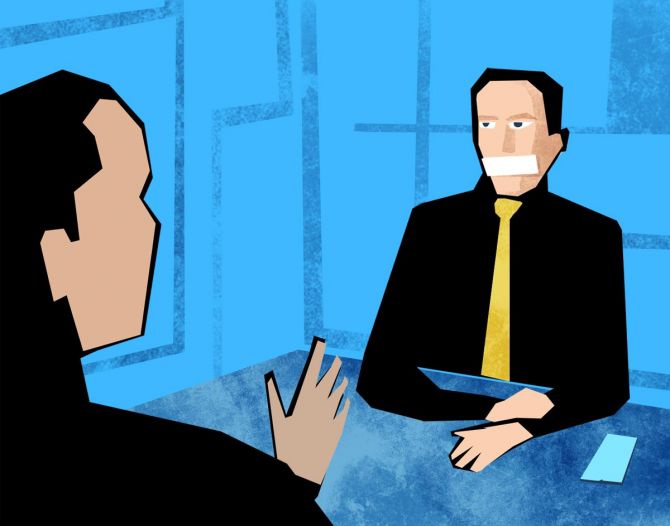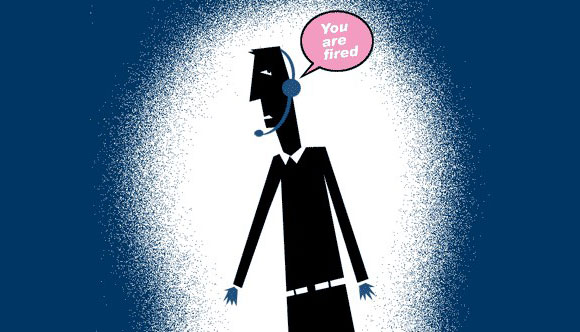Need expert advice on how to set up your business?
Ask rediffGURU Ashwini Dasgupta, personality development coach and a neuro-linguistic programming trainer, HERE.

Anonymous: When HR asks, 'do you have any questions,' what are some of the most thoughtful/intelligent questions to ask HR in a job interview?
Hi there, thank you for asking the question.
It's important to ask questions to the HR/interviewer during the interview.
Asking the right questions are important to demonstrate your genuine interest in the company's mission, the role's responsibilities and how you can contribute to the organisation's success.
When interviewing for a job, it's important to ask questions that demonstrate your interest, engagement and understanding of the role and the company. For example, questions can be around:
1. Roles and responsibilities
'Can you describe the day-to-day responsibilities of this role?'
'What are the performance expectations for someone in this role in the first three to six months?'
'Can you describe the day-to-day responsibilities of this role?'
2. Company and culture
'What is the company's approach to professional development and career growth?'
'To whom will I report and what is their leadership style?'
'How does the team typically collaborate and communicate?'
3. Company Growth and future plans
'What are the company's growth plans and strategic priorities for the next few years?'
'How does this role fit into the company's long-term vision?'
'Are there opportunities for career advancement within the organisation?'
4. Next steps and timeline:
'What are the next steps in the interview process and what is the expected timeline for a decision?'
'Is there anything else you need from me to evaluate my candidacy?'
'When can I expect to hear back regarding the outcome of this interview?'
Hope these examples help you. These are few of the areas I have cited. Accordingly, you can dive into other areas too.
Tip: Only speaking around salary might not create an impressive image.
Rohan: 10 things you should never say in a job interview
Hi Rohan, thank you for writing in.
There are many aspects which one should avoid during interviews. Below is the list for your reference.
- Avoid negative comments about your current or previous employer.
- Salary discussion -- this should be discussed at the later stage and not at the initial stage. HR will block a slot to discuss salary.
- Not preparing enough for the interview.
- Talking about weaknesses without any mitigation.
- Not having any questions for the interviewer.
- Avoid humor if you are not good at it. It can backfire.
- Showing overconfidence (Note: There is a thin line between confidence and overconfidence. Crossing that line can make you seem arrogant).
- Avoid lying. Building trust is the most important aspect in the interview process.
- Avoiding eye contact and overdoing gestures.
- Not being punctual.
Anonymous: Does the IT company background check verify PAN details to see which companies we have worked? Is it good to hide company details if we had issues with earlier company?
Dear Sir/ Madam, thank you for writing in.
IT companies do conduct background checks on potential employees as part of their hiring process.
However, the specifics of the background check may vary from company to company.
Some background checks may include verification of employment history, education credentials, criminal records and other relevant information.
Regarding verifying PAN details, it is more commonly associated with tax and financial purposes rather than employment verification. PAN is a unique ten-digit alphanumeric identifier issued by the Income Tax Department in India. It is typically used for tax-related transactions and documentation.
When it comes to hiding company details due to issues with a previous employer, it's essential to consider the implications and potential risks.
Being dishonest about your employment history can have serious consequences if discovered during the background check or at any later stage. It can lead to the termination of employment or damage your professional reputation.
Instead of hiding company details, it's generally recommended to address any issues with your previous employer transparently and professionally during the interview process.
If there were challenges or conflicts in your previous job, try to provide a balanced perspective and focus on what you learned from the experience and how you have grown as a professional.
You can also emphasise your positive attributes, skills and achievements from your previous roles without dwelling on any negative aspects. The key is to present yourself in a positive light and demonstrate your ability to handle challenges and work well with others.
Remember, honesty and integrity are highly valued traits in the workplace and being upfront about your experiences, both positive and negative, is crucial to building trust with potential employers.
Tip: Avoid speaking negatively about your current and previous employers.
- You can rediffGURU Ashwini Dasgupta ask your start-up related questions HERE.
Please Note: The questions and answers in this advisory are published to help the individual asking the question as well the large number of readers who read the same.
While we value our readers' requests for privacy and avoid using their actual names along with the question whenever a request is made, we regret that no question will be answered personally on e-mail.
All content herein is written and published online for informational purposes only. It should not be relied on as your only source for advice.
If you choose to rely on any information provided herein, you do so solely at your own risk. Opinions expressed herein cannot necessarily provide advice to fit the exact specifics of the issues of the person requesting advice.
Similarly, information received via an external link embedded in an article cannot be relied on as your only source of advice.









